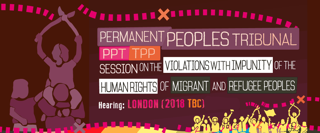Public tribunal finds hostile environment policies foster racism, institutional cruelty and violence by design.
As the scandal over the treatment of the Windrush generation and the failure to offer adequate compensation continues, the Home Office’s immigration and asylum policies are under scrutiny like never before. The Department of Health and Social Care are under fire too for failing to make public reports on the detrimental effects of immigration checks on migrants. Now the jury of the Permanent People’s Tribunal on Violations of the Rights of Migrants and Refugees adds to the pressure, with a damning verdict on the impact of the government’s hostile environment policies. [1]
The jury of the London session of the Permanent Peoples’ Tribunal, comprising eminent academics, lawyers and trades unionists has finalised its deliberation which will be delivered to 10 Downing Street at 11.30am on Monday 3 June. [2]
In November 2018, migrants’ rights groups, trades unionists and NGOs came together to put the ‘hostile environment’ on trial at the fourth European Session of the Permanent Peoples’ Tribunal on the violations with impunity of the human rights of migrant and refugee peoples. [3]
The jury heard written and oral evidence about repressive policies in the UK from over thirty witnesses drawn from frontline services, academia, migrants’ networks, trades unionists, former immigration detainees, care workers, cleaners and domestic workers.
On the basis of the evidence, the jury has found:
- The hostile environment is an environment which facilitates and perpetuates racism and cruelty, a ‘type of violence by design’.
- The hostile environment gives rise to everyday cruelties that include: denial of health care, housing and other public services; denial of the right to work; coercion to work in detention centres without the protection of labour rights; a culture of disbelief in the Home Office in the face of truth telling.
- Hostile environment policies are creating a climate of fear where people cannot avail themselves of basic rights, with irreversible consequences, such as a baby born with disabilities as a result of the mother being deterred from accessing ante-natal care. The NHS charging system, which charges people 150 per cent of the cost of their care, puts hospital care outside the reach of poorly paid migrants and is leading to racial profiling by some NHS staff.
- Policies that are bad for migrants are also bad for citizens (e.g. in the field of public health). Migrants and refugees often act as ‘guinea pigs’ for harsh policies later applied to other groups, e.g. dispersal of homeless families.
- Hostile environment policies have handed power over to opportunistic unscrupulous employers who exploit migrants’ immigration status, facilitating violence and sexual and racial abuse, especially against women.
Chair of the jury, Professor Bridget Anderson comments: ‘During the PPT hearings we saw how the shameful hostile environment policy has legitimised racism and fostered a toxic social environment. Jury members commend the courage of the witnesses who appeared before us, and the commitment of the migrants’ organisations who participated. They are building a world that is better for everyone.’

